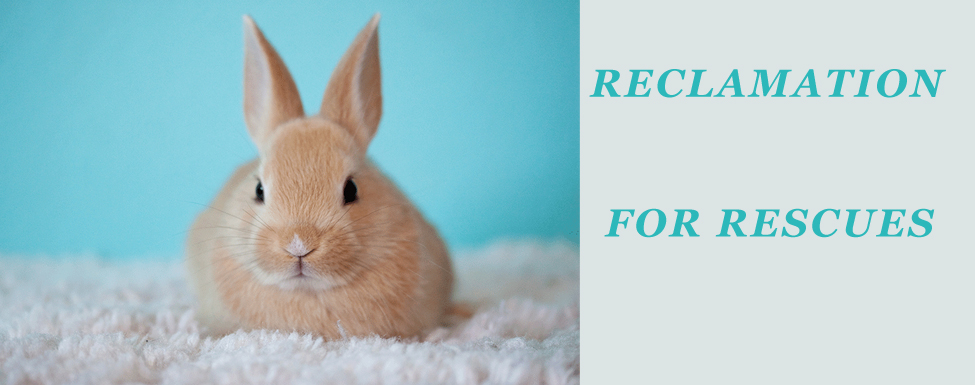Reclamation for Rescues
Full disclosure: I’m an ethical vegetarian. That means that I eschew meat for ethical rather than dietary purposes. My feelings echo those of Sali Owens, who wrote in The Guardian, “I do not think humans have the right to oppress or abuse other species simply because they are intellectually weaker. Toddlers are intellectually weak, but you're unlikely to find one in a casserole.”
Good point. You are warned that everything you read in this article will be filtered through this point of view.
But, there is another layer to the belief that we should not harm animals for our own benefit. We literally should not be taking the coats off their backs to wear on ours. This is harder to achieve than might be imagined. For decades pressure not to produce or wear fur coats has been increasing, but, sadly, to date the campaign has failed to curtail the cruelty or the market for fur. Production of fur coats has more than doubled since the 1990s.
Now, happily, there is a way to make partial amends for the horrors the animals have endured. On March 1, the Berkshire Humane Society (BHS) will launch its first-ever Fur Reclamation Drive to collect fur garments to be dismantled and distributed to wildlife rehabilitators in the Berkshires and surrounding areas.
This project is being spearheaded by Lizzy Brown, BHS’s humane educator, and Pam Youngquist, Ph.D., animal welfare advocate volunteer. “Pam kept getting furs from people who had inherited them and didn’t know what to do with them,” Brown said. “She introduced us to the idea of reclaiming them and using them in the rehabilitation of wildlife. We saw it as a great opportunity to give these furs new meaning and said, ‘Yes, let’s do it.’
“I’m excited about this new endeavor,” Brown continued. “Not only is it an opportunity to put furs to good use, many of which may be in storage or no longer worn—it’s a chance to educate children about local wildlife, and about how we can share our world with them and care for them when they need help.”
Many of the injured and orphaned wildlife nursed back to health by rehabilitators were endangered by human encroachment on their natural habitat. The death of animal parents, or even kidnapping by well-meaning hikers and people spending time outdoors, are other reasons fawns, fox cubs, raccoon kits and other babies find their way into the hands of rehabilitators.
“There are a lot of animals that take up residence in human structures. Mom is trapped or killed, and then the babies are discovered,” said Brown. “Rehabilitators can have dozens and dozens of infants in their care during the spring. It’s a lot of work. We have one rehabilitator, Dawn Collins, who had 130 raccoons one spring.”
Collins, who is particularly dedicated to rehabilitation is granted four months leave each spring to complete her work during breeding season.
The program will begin in March, just before the baby creatures are born.
So far, BHS plans to work with Collins, Judy Pasko and Julie Shannahan, all local rehabilitators. They, along with others, will use the fur pieces to line beds and handmade nests. They will swaddle infants during bottle feeding, and some will use specific parts of the coats, such as fur sleeves, as hot water bottle holders to keep the babies warm.”
Brown said a volunteer youth group, the Defenders, will take the coats apart, removing all non-fur materials.
Another use for the fur is education. Pasko plans to use the furs in her annual Wildlife Rehabilitation Seminars where she instructs beginning rehabilitators. The furs will provide useful, hands-on experience.
“The donated furs ensure very little human imprint will occur so that these wild animals can be returned to their homes in nature once healed,” said Youngquist. “There is no greater joy than supporting those animals who cannot defend or speak for themselves. For all who are willing to open their closets and make the choice to have compassion be their fashion, your courage and generosity count beyond measure.”
The drive welcomes all fur coats, gloves, stoles and other fur items or partial fur items. No mothball affected or recently dry-cleaned furs can be accepted because of the chemical residue. From March 1st to March 31st, people wishing to donate their furs may drop them off at the following locations during normal business hours.
Berkshire Humane Society • 214 Barker Road • Pittsfield • MA • 413-447-7878 ext. 129 • BerkshireHumane.org
Purradise • 301 Stockbridge Road • Great Barrington • MA • 413-717-4244
Catwalk Boutique • 325 Stockbridge Road Great Barrington MA 413-717-4005 CatwalkBoutique.org
Bark N’ Cat 28 Holden Street North Adams MA 413-664-7777
If donors wish to claim a deduction for their donation, they should consult IRS.gov and their tax specialist. Donated items should be appraised prior to drop-off and any required tax forms, such as Form 8283, must be completed in advance and presented at the time of donation. For questions, call Lizzy Brown at 413-447-7878, ext. 129 or email: ebrown@berkshirehumane.org
The Berkshire Humane Society is a private, nonprofit, open-admission animal support organization with a two-fold mission: to ensure the compassionate care, treatment and, whenever possible, placement of homeless animals through the shelter operation; and to promote and improve the welfare of all animals through community education and outreach.
